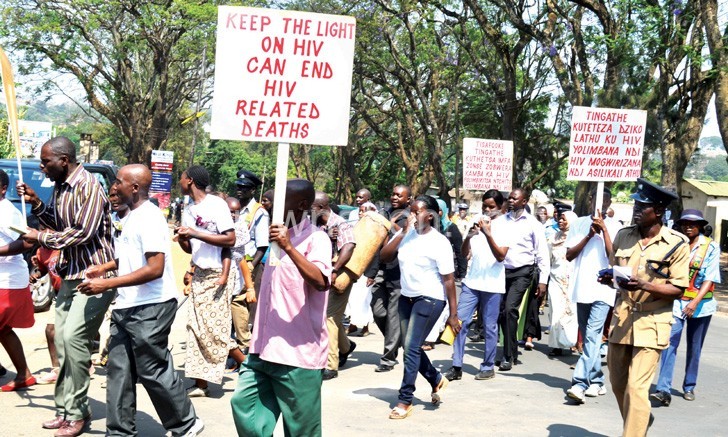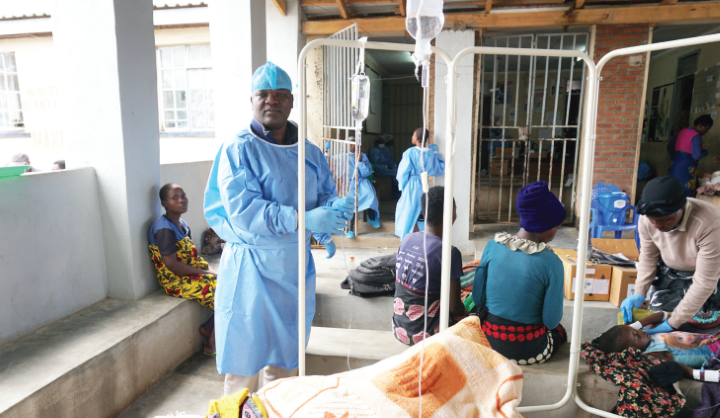Fighting HIV at Dzaleka
It is around 6pm at Dzaleka Refugee Camp in Dowa, precisely along the road called Blantyre, a name derived from Malawi’s commercial city located in the Southern Region.
The road is busy with pedestrians and on the edges are women, selling locally brewed beer such as Kachasu, Mgoligoli, Ntonjani and Kanyanga. Ladies of all ages have lined along the road waiting for men wanting to quench their sex thirst. One by one, they disappear to a hideout behind grass-thatched beer selling points.

“This is the way people live here. Men who have money buy sex from these young women. Most of these women come from very poor homes. They rely on selling sex to support their homes,” says Masumbuko Ramazan, the founder of Yetu Community Radio Station, which is expected to open its airwaves in two weeks time at the camp.
Ramazan, who originally hails from the Democratic Republic of Congo (DRC), says the camp is marred by acts of immoral behaviour.
He adds: “It is worse during the night. People have sex on the verandas. Worse still, the majority are minors.”
The camp comprises people from 14 nationalities which include Burundi, DR Congo, Somalia and Ethiopia. According to Ramazan, beer drinking is part of culture for most of these nationalities.
However, there is now alcohol abuse among them, mainly the youths.
“Most of the youths are alcohol addicts. They do not care about their lives and they usually engage in unprotected sex,” he says.
The situation is contributing hugely to to the rising HIV infection rate at the camp, which accommodates 29 000 refuges. This prompted Ramazan and Henry Chishiku to establish Yetu Community Radio Station to sensitise the community to the pandemic. They have been using loud speakers to spread HIV and Aids messages, but Ramazan says this was not enough. They want to reach many people and this is why they applied for a radio station licence.
He says their radio committee has already started working hard to fight against HIV and Aids. For example, they formed support groups which give hope to people living with HIV. They also move door to door to sensitise people against discriminating people living positively.
Although they have reached many people, Ramazan says there is a lot to do particularly to convince every refugee and those in the surrounding areas to undergo HIV testing. He adds that there is also need to empower women in the area to keep them away from promiscuity which puts their lives at risk of contracting HIV.
“We need to cultivate a sense of responsibility among most of these refugees so that they avoid indulging in unprotected sex. Our meetings with some people show that information gap and a sense of being a refugee makes most of them behave irresponsibly and that is what we are fighting,” explains Razaman.
They are not alone in the fight against HIV and Aids at Dzaleka. Manson Chinkhuzi, a Health Surveillance Assistants Supervisor and HIV Testing and Counseling (HTC) counselor at Dzaleka Health Centre, reveals that discrimination is serious in the area and is keeping many people away from going for HIV testing.
He says the clinic also encourages marriage partners to go for HIV testing and counseling together. According to Chinkhuzi, some men have been accessing life prolonging drugs without the knowledge of their spouses.
The health centre’s fight against the epidemic is in line with the UNAids’ ambitious goal of achieving 90:90:90 targets as adopted in the 2015-2020 National HIV and Aids Strategic Plan, which seeks to reduce HIV and Aids by 2020.
The targets aim at diagnosing 90 percent of all people living with HIV, starting and retaining 90 percent of those diagonised on antiretroviral therapy (ART), and achieving viral suppression for 90 percent of individuals on ART.
The health centre is also taking the fight against stigma seriously at the camp. Stigma is a problem in many communities in the country. More than three decades into the Aids epidemic, stigma and discrimination continue to hamper efforts to prevent new infections and engage people in HIV treatment, care and support programmes.
Numerous studies have linked HIV-related stigma with avoiding of HIV testing, non-disclosure to partners and poor engagement in biomedical prevention approaches. Similarly, internalised stigma, which refers to the negative consequences that result when people believe stigmatising public attitudes apply to them, is a well-established barrier to medication adherence. In response to this evidence, stigma reduction is now a key priority in achieving an Aids-free generation.
Beyond this, accessible treatment has been isolated as key in achieving the 2020 ambition in the HIV and Aids fight. UNAids has also emphasised the need to address defaulting treatment due to religious beliefs and discrimination.
UNAids executive director Michel Sidibé, in a press statement released ahead of the World Aids Day said: “With access to treatment, people living with HIV are living longer. Investing in treatment is paying off, but people older than 50, who are living with HIV, including those on treatment, are at increased risk of developing age-associated non-communicable diseases, affecting HIV diseases progression.”
He sees hope in future, but with collaborations and concerted efforts towards fighting the pandemic.
“We can’t stop now. This is the time to move forward together to ensure that all children start their lives free from HIV, that young people and adults grow and stay free from HIV and that treatment becomes more accessible so that everyone stays Aids-free,” he says.





